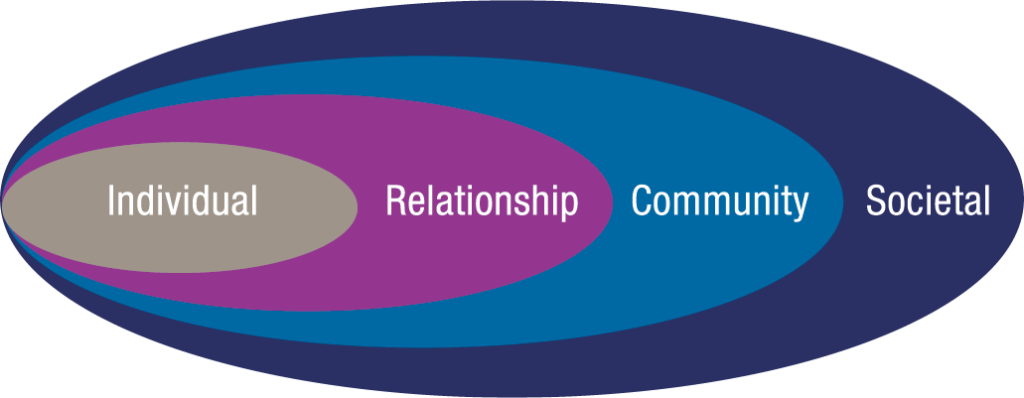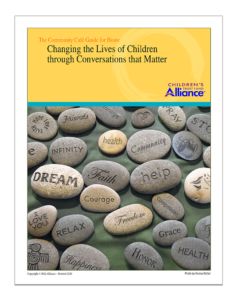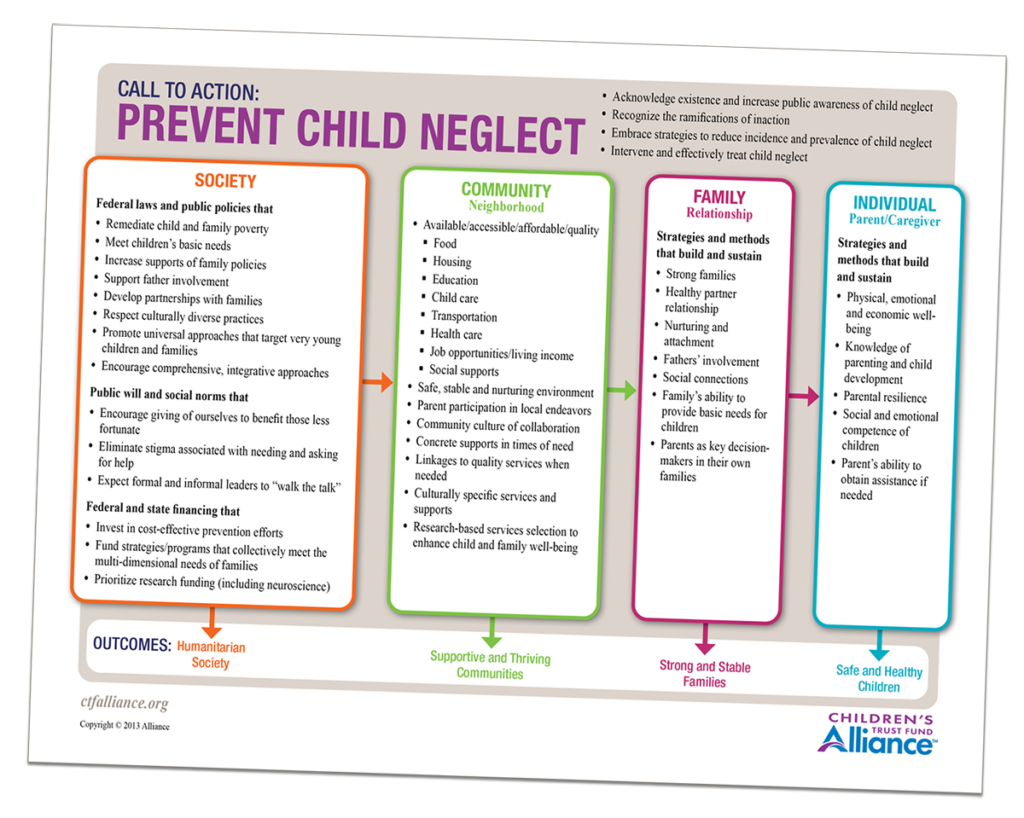Building Healthy Communities
“Community well-being is the combination of social, economic, environmental, cultural and political conditions identified by individuals and their communities as essential for them to flourish and fulfill their potential.”
– Wiseman, J. and Brasher, K.
Strategies
Surrounding  families with supportive neighborhoods, communities, businesses, schools, services and systems is a critical way to support the well-being of children and families. The socio-ecological framework explains that caregivers and children operate within the context of their family, which operates within the context of a community, which operates within the broader society consisting of systems and services, organizations and religious communities, businesses and government at the city, county, state and national levels. Identifying, developing and strengthening positive community norms – shared and perceived values, beliefs, attitudes and behaviors – to support child well-being and family protective factors within and across these contexts will reduce the likelihood of child maltreatment and lead to better outcomes for children and their families.
families with supportive neighborhoods, communities, businesses, schools, services and systems is a critical way to support the well-being of children and families. The socio-ecological framework explains that caregivers and children operate within the context of their family, which operates within the context of a community, which operates within the broader society consisting of systems and services, organizations and religious communities, businesses and government at the city, county, state and national levels. Identifying, developing and strengthening positive community norms – shared and perceived values, beliefs, attitudes and behaviors – to support child well-being and family protective factors within and across these contexts will reduce the likelihood of child maltreatment and lead to better outcomes for children and their families.
The Alliance seeks opportunities to “infiltrate” systems (health, education, child care, business, etc.) and contexts (individuals, families, communities and beyond) with approaches and knowledge that promote well-being and prevent maltreatment. This involves diverse partnerships and collaborations.
Equity and Inclusion
To achieve these results, the Alliance incorporates a racial equity and inclusion lens in every facet of our work. For ALL children to succeed, they must have the same opportunities to reach their potential. Race holds a central place in our society’s deepest and most persistent patterns of social inequities, exclusion and divisions and it plays a defining role in one’s life trajectory and outcomes. Racism and racial inequities threaten the capacity of families, communities and systems to protect and promote the well-being of children. Without equity, economic stratification and social instability will continue to increase and far too many families and children will continue to be harmed and suffer. All of these issues contribute to societal neglect of children, their families and their communities.
Successful prevention is supported by personal understanding of the diverse contexts in which families, workers, organizations and policymakers operate.
Resources and Tools
It is important that communities have resources and tools to ensure that families are engaged and supported and that agencies and organizations understand their interests and needs. The Alliance and state children’s trust and prevention funds are invested in building strong and healthy communities and in strengthening the systems, agencies and organizations that are part of each community.
Communities can benefit from using Community Cafés to engage parents and other community members in meaningful conversations about things that matter to families. Through Community Cafés, communities can hear their residents perspectives and interests. An approach to using evidence in a way that honors the expertise of community members, along with the best available research and the perspective of practitioners, can help ensure that services and supports are accessible and appropriate. Also, the Alliance’s work on preventing child neglect provides many useful tools and ways of thinking about being more intentional in supporting children and families.
Community Cafés
 Communities Use the Community Café Approach to Create the Change They Envision
Communities Use the Community Café Approach to Create the Change They Envision
Hosting a Community Café is an approach that uses meaningful conversations to spark leadership and relationships needed to strengthen families. Three components make up this approach:
- The World Café Principles for designing powerful conversations
- Appreciative Inquiry, which helps to ensure continuous quality improvement and growth based on past success and strengths
- The Strengthening Families™ Protective Factors Framework provides the context for all activities
Trained caregivers from the community host conversations in partnership with organizations. Inclusive conversations increase community wisdom and amplify family and community voice to improve lives for children. Conversation spaces serve as a safe, equitable place where family and community can work together.
Tools
- Alliance Community Café Guide for Hosts: Changing the Lives of Children through Conversations that Matter

Local Implementation
Community Toolkit to Prevent Child Neglect
 Child neglect is the most pervasive area of child maltreatment and is responsible for the majority of foster care placements for children. The impact on a child’s physical and emotional development is serious and significant and there are many challenges in preventing it from occurring. The issues related to child neglect are broader than those relating only to individual families. There are protections that need to be in place in communities and throughout our country before we are likely to see much-needed positive changes in this issue.
Child neglect is the most pervasive area of child maltreatment and is responsible for the majority of foster care placements for children. The impact on a child’s physical and emotional development is serious and significant and there are many challenges in preventing it from occurring. The issues related to child neglect are broader than those relating only to individual families. There are protections that need to be in place in communities and throughout our country before we are likely to see much-needed positive changes in this issue.
The “Community Toolkit to Prevent Child Neglect” is the result of the Alliance’s research on the prevention of child neglect. This effort was led by a prominent expert in the field, Caren Kaplan. Caren devoted her life to work in this field and although she lost her battle with cancer, she succeeded in laying a great foundation for this continuing work at the Alliance. We are indebted to her and her contributions.
At the conclusion of the initial research phase, the entire membership of the Children’s Trust Fund Alliance engaged in a process to create a theory of change around the prevention of child neglect. Based on the priorities of that theory of change, a series of tools emerged.
TOOLS
These tools are concrete resources that are ready for use in communities. They will help us understand the research, communicate about what we all can do and help us embrace the idea that when we all work together – child neglect is preventable!
- Research
- Infographics
- Fact Sheets
- Presentation Materials
Evidence For Positive Outcomes

Sandra Killett, BPNN Parent Leader
“We pay now – or we pay later. And it’s very costly when we pay later.”
– Sandra Killett, BPNN Parent Leader
The Children’s Trust Fund Alliance supports effective programs that strengthen families and prevent child abuse and neglect. The Alliance believes that evaluations of program effectiveness should incorporate rigorous designs along with practitioner experience and family wisdom. The Alliance is committed to advancing the cumulative progress toward decreasing child maltreatment that will occur through continuing and expanding support for the practices and programs that have demonstrated effectiveness.
The Alliance supports states’ children’s trust and prevention funds as they develop and implement innovative practices that are supported by practitioner and family wisdom. This balanced approach contributes to the overall goal of decreased child maltreatment. The Alliance and the children’s trust funds are ever mindful of the necessity and the urgency to continue this work in light of the costly social, health, and financial burdens on society that occur because of child maltreatment.
The tools shared here are exemplary in their inclusion of practitioner and family wisdom and grounded in research.
Ohio
Washington State
- Parents and Child Care Providers in Partnership: Planting SEEDS for Success
- Parents Define Quality – I’ll Know It When I See It (IKIWISI)
- The Strengthening Families ™ Protective Factors as a Framework for Grantmaking: An Approach for Funding Decisions, Building Capacity and Promoting Optimal Outcomes for Children and Families
